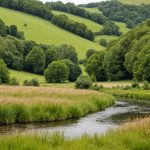Practical Tips for Sustainable Boating
Adopting sustainable boating practices is vital in preserving our waterways and marine environments. By incorporating eco-friendly boating tips, you can actively reduce the negative impacts associated with traditional boating activities. Here are some practical approaches to consider:
Boaters should prioritise the importance of eco-conscious boating habits, which include measures like reducing speed to lower wake and noise pollution. Noise from engines can disturb marine life, so equipping your boat with mufflers and opting for quieter motors is beneficial. Furthermore, employing eco-friendly cleaning products helps decrease chemical pollution in the water.
Also to see : Enhancing UK Farmlands: Cutting-Edge Hedgerow Techniques for Maximizing Biodiversity
To minimize your ecological footprint, engage in responsible wildlife observation. This involves maintaining a respectful distance from habitats and not pursuing or feeding wildlife. Using designated paths and channels can also help avoid disrupting ecosystems.
- Adopt slower speeds to reduce noise and wake.
- Use biodegradable cleaning agents to alleviate chemical discharge.
- Keep a safe distance from wildlife and refrain from disturbing their natural activities.
By following these sustainable boating practices, you actively contribute to the well-being of aquatic environments and foster a more harmonious coexistence with nature.
Also to discover : Boosting UK Farmers’ Impact: Eco-Friendly Farming to Safeguard Barn Owl Habitats
Understanding UK Regulations for Boating
Navigating boating regulations in the UK requires understanding the legal requirements for boaters to ensure safety and environmental protection. These regulations are designed to maintain the integrity of waterways and support sustainable boating practices.
Overview of UK Boating Laws
UK boating laws encompass essential activities such as registration and compliance with maritime safety standards. All motorboats must be registered with the correct authority, and operators should understand navigation rules to prevent accidents.
Environmental Protection Regulations
Environmental regulations focus on safeguarding waterway ecosystems. Boaters are encouraged to avoid sensitive areas, such as breeding grounds of protected species, ensuring they adhere to specific guidelines for freshwater habitats. Regulations mandate the use of eco-friendly boating tips, such as low-emission engines, to minimise pollution.
Licensing and Registration Requirements
Licensing involves demonstrating knowledge about boat operation and safety. Failure to comply with licensing and registration requirements can lead to legal repercussions. Checking for conservation efforts and adhering to them not only avoids fines but contributes to wildlife conservation and the overall health of marine life.
The adherence to these regulations encourages an eco-conscious approach among boaters, aligning with broader goals for marine protection and sustainable practices.
Protecting Wildlife During Boating Activities
Wildlife conservation is pivotal when engaging in boating activities, emphasising the need for boaters to be mindful of their surroundings. Recognising and respecting wildlife habitats involves identifying areas where various species thrive, such as coral reefs or nesting sites, and steering clear of these sensitive zones. Avoiding propeller damage by slowing down near shoreline grasses is a simple way to minimise the impact on marine life.
Tips for safe wildlife interactions include observing without approaching or touching animals, which can stress or harm them. Using binoculars for a closer look or maintaining a responsible distance ensures the safety of both wildlife and boaters. Additionally, learning about the local wildlife can enhance understanding and promote respectful behaviour.
Methods to minimise disturbance to aquatic species encompass reducing noise pollution by limiting engine use in habitat-rich zones and refraining from sudden manoeuvres that may disrupt feeding or mating. Opt for non-toxic sunscreen that won’t harm coral reefs.
Boaters can adopt these practices to bolster wildlife conservation, ensuring the vibrancy and health of marine ecosystems. Such mindful boating practices are crucial for maintaining biodiversity and sustaining the beauty and balance of our waters.
Effective Waste Management Strategies for Boaters
Practicing proper waste management in boating is crucial to reducing pollution and maintaining the beauty of our waterways.
Garbage Disposal Practices
Boaters must responsibly manage waste to prevent contamination. Carrying out all waste is a fundamental practice, meaning nothing should be disposed of overboard. Utilize local disposal facilities whenever possible to ensure trash is processed correctly. Many marinas provide designated receptacles, encouraging boaters to dispose of waste responsibly.
Sewage Treatment Options
Handling sewage effectively is vital for eco-friendly boating. Consider installing on-board treatment systems or portable toilets that comply with local regulations. Modern systems efficiently treat waste before being discharged, minimizing environmental impact. Regular maintenance of these systems prevents leaks or overflows that could harm aquatic ecosystems.
Recycling and Upcycling Materials
Enhancing sustainability on the water involves recycling and upcycling materials. Use biodegradable products to reduce harmful residues in marine environments. By recycling plastics and other materials on board, boaters lessen their ecological footprint. Encourage practices like reusing containers or repurposing old gear, which contribute positively to the environment. Ultimately, being conscious of waste management decisions fosters a cleaner, healthier marine habitat.
Eco-Friendly Boating Gear and Technologies
Incorporating sustainable boating gear enhances the environmental responsibility of boating activities. Eco-friendly equipment, such as electric motors, solar panels, and biodegradable cleaning supplies, reduces harmful emissions and chemical discharge. Innovative eco-friendly boating products stand out as they help preserve aquatic ecosystems while providing reliable performance.
Renewable energy sources like solar power offer substantial advantages by generating clean energy. Solar-powered systems can efficiently run navigation equipment and charge onboard devices, lessening reliance on fossil fuels. Lightweight wind turbines also present a viable option for sustainable energy on boats, harnessing natural resources for propulsion and onboard power needs.
When comparing traditional vs. sustainable gear options, sustainable products often outperform older technologies in efficiency and environmental impact. While traditional engines release significant emissions, electric motors provide a quieter and cleaner experience, contributing to decreased noise pollution in marine environments.
For environmentally conscious boaters, embracing sustainable options in their boating gear fosters an eco-friendly culture. Utilizing these advancements ensures that boating activities become more harmonious with nature. Opting for eco-friendly equipment not only benefits marine life but also aligns with broader goals of sustainability and conservation in the boating community. This shift towards sustainable technologies exemplifies responsible enjoyment of our waterways.
Resources and Local Initiatives for Marine Conservation
Engaging with marine conservation organizations and local community efforts presents an excellent opportunity for boaters to contribute positively to environmental protection. In the UK, numerous notable groups spearhead initiatives to safeguard marine life.
Notable UK Conservation Groups
Organizations such as the Marine Conservation Society actively work towards protecting British waters. They provide resources and host clean-up events, empowering individuals to make tangible differences. Similarly, The Wildlife Trusts offer volunteering opportunities focused on conserving marine biodiversity along the UK coastline.
Community Events and Engagement
Participating in local events such as the annual Great British Beach Clean allows boaters to actively engage in monitoring and cleaning vital marine habitats. These gatherings encourage camaraderie while emphasising the collective effort needed to maintain healthy waterways.
Educational Resources for Boaters
Access to educational materials and workshops equips boaters with the knowledge needed to navigate areas effectively without harming marine ecosystems. Guides highlighting best practices in wildlife conservation and waste management can help boaters adhere to eco-friendly habits. Community advocacy plays a crucial role here, uniting individuals with shared objectives to foster sustainable boating practices across the UK.










